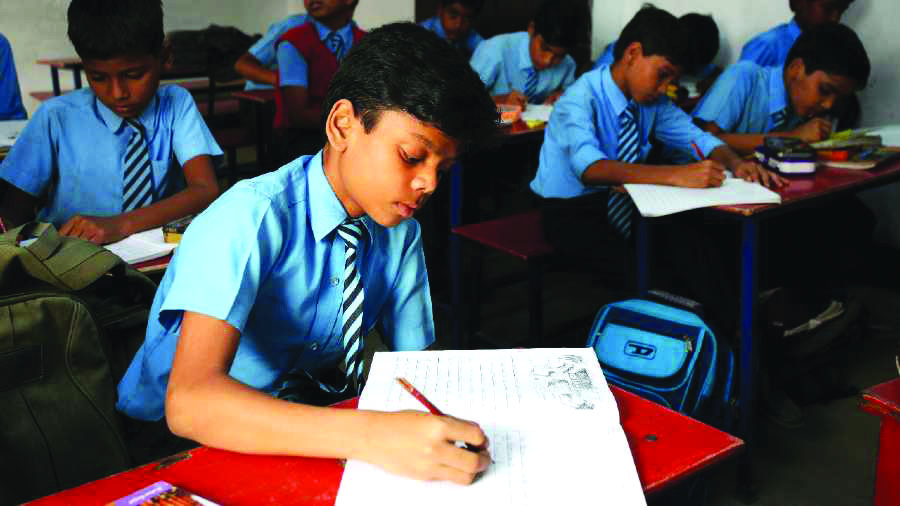Reshma Ravishanker (Bengaluru)

Class VIII students writing board exams
After a month-long flip-flop over conducting class V, VIII and IX ‘summative assessments’ aka board exams for government and private schools affiliated with the Karnataka School Examination and Assessment Board (KSEAB), the last leg of the exams was conducted on March 25-26. This after the Karnataka high court (March 23) directed KSEAB to hold the exams without delay “in the interest of students”.
The conclusion of these exams came after a month-long drama. Last December, the state’s department of school education and literacy issued a circular stating it will conduct ‘no-detention summative assessments’ in March for classes V, VIII and IX to enable schools to assess the learning levels of students. Under s.30 of the landmark Right of Children to Free & Compulsory Education (RTE) Act, 2009, board exams were prohibited for children in elementary education (classes I-VIII) and s.16 provided that no child should be “held back in any class until completion of elementary education.”
However in 2019, following complaints that under-prepared children were routinely being promoted to higher class, the BJP government at the Centre amended the RTE Act to permit exams in elementary education and also detention of children who fail more than twice, in the same class.
Surprisingly four months ago, the Congress government which was elected to power in Karnataka last May, issued an order to KSEAB to conduct exams for elementary school children. Despite the circular stressing that no child will be failed/detained, the Registered Unaided Private Schools Association (RUPSA), a representative association of 13,000 private schools in the state, petitioned the Karnataka high court seeking a stay on the exams for imposing unwarranted stress on young children.
On March 6 — five days before the board exams were to begin on March 11 — a single judge of the Karnataka HC quashed the exam notification. Next day on March 7, after the state government appealed, a division bench comprising Justice K. Somashekar and Justice Rajesh Rai K stayed the March 6 interim order, ruling that “the present situation of uncertainty would be detrimental to the student community virtually on the eve of their examinations,” and ordered the state government to go ahead with staging the examination for elementary school children.
Dissatisfied with the order, RUPSA appealed to the Supreme Court. On March 12 — second day of the exam — Justices Bela M. Trivedi and Pankaj Mithal, while noting that the board exams violate s.30 of the RTE Act, referred the case back to the Karnataka high court. On March 23, the high court ordered the state government to complete the remainder examinations without delay.
The re-introduction of KSEAB summative exams for youngest children has been heavily criticised by parents, school associations and educationists who argue board exams arouse fear and anxiety within children. “The term ‘board’ evokes fear in every Indian student’s heart. No matter how hard working a student is, the prospect of a board exam instills instant anxiety… By deciding to reintroduce board exams for classes V and VIII, the Karnataka government is pushing the system several steps backwards. The RTE Act, passed by Parliament in 2009, had stipulated that instead of annual board exams, school-based assessment techniques such as comprehensive and continuous evaluation (CCE) should be used. For a few years, several state government directorates and the CBSE displayed great enthusiasm to promote school-based assessment…,” writes Dr. Krishna Kumar, former director of NCERT (see p.34).
Moreover, the state government has also come under criticism for its poor planning and execution of the exam. Bizarrely, KSEAB instructed students to bring their own plain-paper answer scripts to exam halls — traditionally provided by exam boards/schools. After several School Development Management Committees and private school associations protested, a revised circular was issued on March 8 that the board would provide answer scripts. The latest in the saga is that KSEAB has given teachers a mere five days to complete evaluation of answer scripts of 2.8 million children.
Comments T. Lokesh, president, RUPSA: “The purpose of these exams has been defeated by the way it has been conducted. We objected to these exams because they are against the rights of children and subject them to unwarranted stress. Not only did the very idea of board exams cause children stress but the way the government managed it, from initially refusing to provide answer scripts, to now the confusion over evaluation, has aggravated student anxiety multifold. Teachers are expected to evaluate 80 answer scripts each day for class V exams, 60 for class VIII and 40 for class IX. How can teachers evaluate 2.8 million students’ papers in such a short time? Can this hurried and summary evaluation replace the detailed CCE done by teachers? Definitely not.”
However, it’s pertinent to note that while RUPSA opposes the board exam for classes V, VIII and IX children, the Associated Managements of Private Schools in Karnataka (KAMS) welcomes them with its general secretary D. Shashi Kumar, deeming the whole controversy around the exams as “unnecessary”, since no child in classes I-VIII is likely to be detained.
The sufferers in this indeed “unnecessary” government-created controversy are the state’s 2.8 million children who had to live an anxious month of flip-flop over conduct of the exams, and now have an anxious wait ahead for the all-important ‘board’ results.
There’s no shortage of evidence endorsing the student-friendly CCE system as the better alternative, especially for primary school children. The National Education Policy 2020, based on the 484-page draft of the Dr. Kasturirangan Committee Report, also unequivocally mandates shift from summative assessment to continuous, formative, competency-based assessments for elementary school children. But as always, government knows better.



























